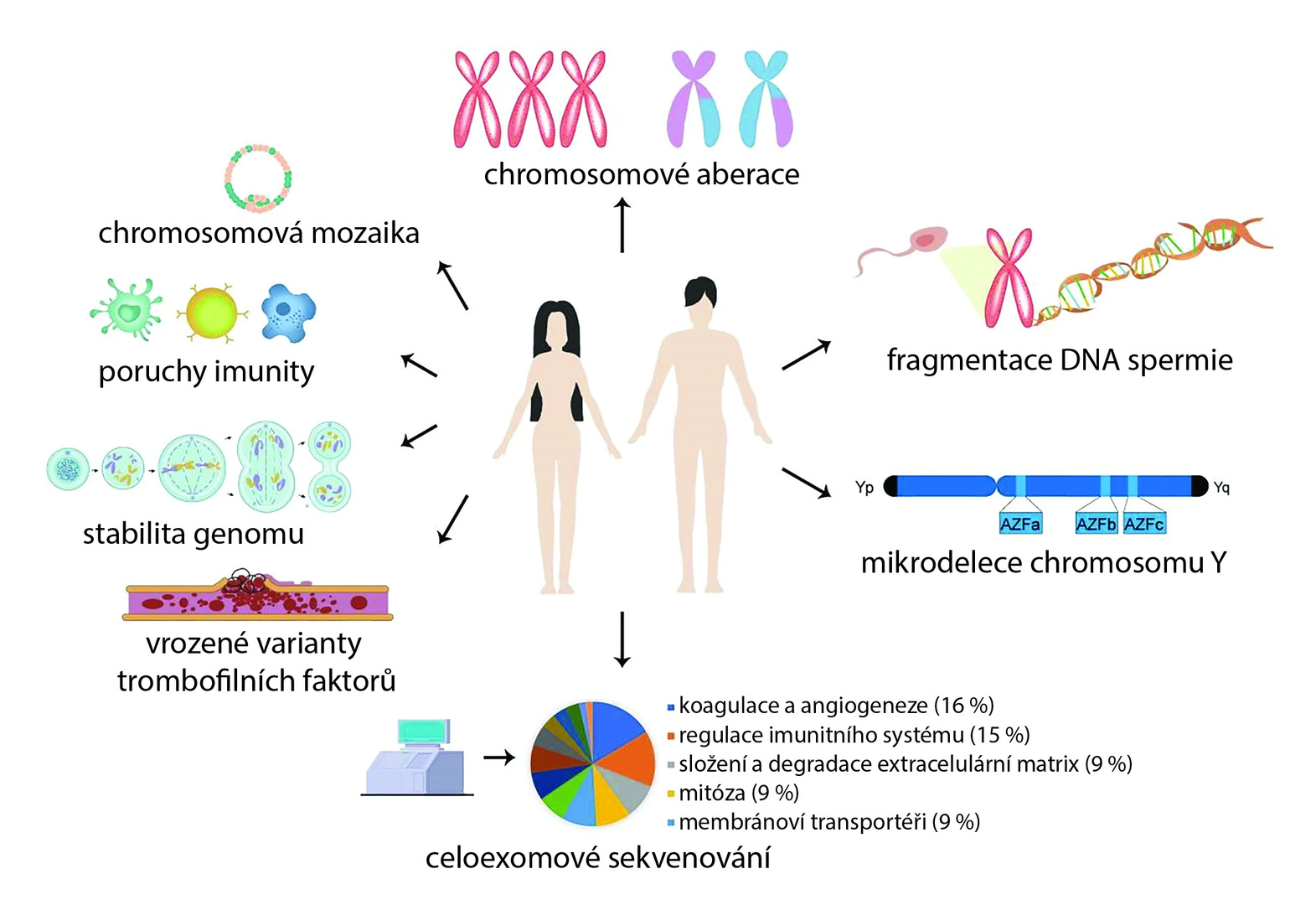Etiology of Recurrent Reproductive Losses – Focus on Genetics
Repeated pregnancy losses pose a significant threat to a woman's physical and mental health. The etiology of up to half of these cases remains unexplained, and recurrent reproductive losses are considered a complex disease. We provide a brief overview of the current knowledge on their possible etiology and genetic correlations, both on the part of the mother and father.
The Mystery of Repeated Miscarriages
Recurrent pregnancy loss (RPL) is defined as ≥ 2 spontaneous pregnancy losses before 24 weeks of gestation. It includes reproductive losses after spontaneous conception and assisted reproduction, but not ectopic and molar pregnancies or implantation failure.
The prevalence of RPL is 0.8-1.4% for pregnancies verified by ultrasound and 2-3% for all biochemically detected pregnancies. In 50% of couples with RPL, a clear cause is not identified. According to current knowledge, RPL is multifactorial. Causes include uterine anatomical defects, immune or endocrine system disorders, infectious agents, hypercoagulable states, chromosomal abnormalities, and lifestyle factors. Factors increasing their incidence include environmental pollution, radiation, unsuitable temperature conditions, malnutrition, stress, anxiety, smoking, alcohol consumption, and obesity.
The incidence of RPL is increasing globally, and one of the most important primary risk factors is genetic abnormalities.
Fig. Genetic factors involved in the etiology of RPL.1 Clinical studies have identified many genetic factors associated with RPL, including gene variants related to coagulation, immune response, extracellular matrix remodeling, etc.

Genetic Causes of RPL from the Mother's Side
Chromosomal Aberrations
Embryonic chromosomal aneuploidies are considered the main cause of pregnancy loss in humans, responsible for approximately 60% of sporadic spontaneous pregnancy losses. These chromosomal abnormalities typically arise as random errors during meiotic division during oocyte development. The occurrence of these disorders correlates with the mother's higher age.
The incidence of embryonic aneuploidies is lower in women with RPL compared to sporadic spontaneous miscarriages. However, 4-10% of couples with RPL have been found to carry structural and numerical chromosomal aberrations (balanced translocations, inversions, numerical aberrations, etc.), more frequently in women, especially older ones.
Chromosomal Mosaics
Maternal mosaicism in the mother can lead to fetal aneuploidies and should be considered if the same aberration repeatedly occurs in the fetus.
Factors Associated with Genome Stability of Early Embryonic Cells
Additional factors can contribute to the development of embryonic aneuploidy. It has been shown that mutations in the KHDC3L gene may be related to genome integrity disruptions and apoptosis of early embryonic cells. Variants in the PLK4 gene, which controls centriole duplication during mitosis, may also be associated with an increased risk of aneuploidy during early human embryo development.
Inherited Thrombophilias in Women
Thrombophilia may increase the risk of RPL due to disrupted placental perfusion caused by thrombosis or occlusion of placental vessels. Genes for factor V (F5), enzymes involved in homocysteine metabolism (MTHFR, MTR, MTRR), and prothrombin (F2) have been investigated in this regard. While there appears to be a link between Leiden mutation in factor V and G20210A mutation in factor II with a higher risk of RPL in women, the impact of MTHFR gene variants C677T and A1298C on RPL risk remains controversial.
Factors Influencing Immune Response
The fetus, with its paternal antigens, poses a semi-allogeneic challenge to the mother's immune system. Maternal immunotolerance is crucial for the physiological development of the fetus. Some genetic variants affecting immune processes in the mother are risk factors for RPL, with current research focusing on the HLA-G antigen.
Genome
Whole genome sequencing in women and men with RPL has revealed 66 maternal and 12 paternal candidate genes associated with RPL.
Genetic Causes of RPL from the Father's Side
Chromosomal Aberrations
One of the most common causes of RPL are numerical and structural chromosomal abnormalities in sperm. Generally, these can arise de novo during spermatogenesis.
Sperm DNA Fragmentation
For fertilization and embryo development, the integrity of sperm DNA is crucial. Damage to this DNA, known as SDF (sperm DNA fragmentation), can reduce fertility, lead to embryonic development arrest, or pregnancy loss. Several studies have observed an association between SDF and RPL.
Y Chromosome Microdeletions
Microdeletions in the Y chromosome are associated with male infertility. Higher prevalence of microdeletions in the proximal AZFc region has been described in men from couples with RPL compared to men from fertile or infertile couples. However, subsequent studies have not confirmed this association.
Single Gene Variants
Recent studies have found a correlation between the C677T polymorphism in the MTHFR gene in men and the etiology of RPL. The ANXA5 gene, encoding an anticoagulant protein highly expressed in the human placenta, has also been identified as a factor associated with RPL. Carriers of haplotype 2 of the ANXA5 gene have a doubled risk of RPL compared to the general population. Genetic variants in USP26 (ubiquitin-specific peptidase 26) may also play a role in the etiology of RPL.
Recommended Examination of Couples with RPL
The current Czech recommended guidelines for genetic laboratory examination in cases of recurrent reproductive losses (defined as 2 unsuccessful pregnancies including “biochemical pregnancy” not confirmed by ultrasound, excluding ectopic and molar pregnancies) include karyotyping of both partners to identify congenital balanced chromosomal aberrations, and thrombophilic mutation tests in women – genes F5 (Leiden mutation of FV) and F2 (prothrombin mutation G20210A) – as well as cytogenetic and molecular genetic examination of the aborted fetus.
(zza)
Sources:
1. Chunwei C., Shiyu B., Jing Z. et al. Understanding recurrent pregnancy loss: recent advances on its etiology, clinical diagnosis, and management. Med Rev 2022; 2 (6): 570−589, doi: 10.1515/mr-2022-0030.
2. Genetic laboratory examination in reproductive genetics. 3rd revised edition. Recommended procedure. Society for Medical Genetics and Genomics CLS JEP, 10. 10. 2018. Available at: https://slg.cz/documents/11/doporuceny-postup-reprodukcni-genetika-2018-10-10.pdf
Did you like this article? Would you like to comment on it? Write to us. We are interested in your opinion. We will not publish it, but we will gladly answer you.
